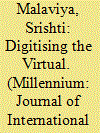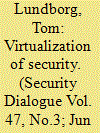| Srl | Item |
| 1 |
ID:
176021


|
|
|
|
|
| Summary/Abstract |
This article offers a relational analysis of the use of armed drones in the ‘war on terror’. Drawing from Erin Manning’s writings on movement, relations, and the posthuman, I explore how bodies and spaces are read as digitised data in the processes of the drone assemblage, reducing movement to displacement and undoing relations of becoming. The drone’s violence lies in its crippling of bodies’ capacity to respond to their immediate environments and relations. The point of departure for this article is the concept of the ‘virtual’ as drawn out by Manning: the indeterminate potential of movement which moves bodies and relations. My analysis revisits the transcripts of Uruzgan drone attack in Afghanistan in 2010, a case that has been extensively studied in the critical literature on drones to offer conceptions of what it means for the drone to be a posthuman entity. Instead of situating the drone as a posthuman object, I examine it from a posthuman methodology where the focus is on relations, rather than determinate actors or outcomes. My intervention here is twofold: to propose a framework for understanding the drone’s violence in its processes of disrupting and undoing relations, and relatedly to argue for the methodological and theoretical value of the posthuman.
|
|
|
|
|
|
|
|
|
|
|
|
|
|
|
|
| 2 |
ID:
145974


|
|
|
|
|
| Summary/Abstract |
During the last couple of decades, the virtual has emerged as a forceful conceptual tool in security studies. While used primarily in order to question assumptions about an objective truth concerning the meaning and value of security and different forms of insecurity, the implications of drawing on this concept vary considerably depending on how the virtual is conceptualized, and specifically how the potentiality of the virtual is linked to the process of actualization. Turning to the philosophies of Baudrillard, Agamben and Deleuze, as well as key thinkers in contemporary security studies, this article delineates three different approaches to analysing the virtualization of security. Focusing in particular on how these approaches point to contending views of ‘capture’ and ‘resistance’, it is argued that the choice of approach has serious implications for grasping what is at stake politically in the process of virtualization. These implications relate, more precisely, to how the virtual opens up and/or closes down the spaces of resistance that the modern subject of security traditionally has relied upon. In this way, the virtualization of security not only is important for thinking about capture and resistance, but challenges the very ground on which the modern subject of security rests.
|
|
|
|
|
|
|
|
|
|
|
|
|
|
|
|